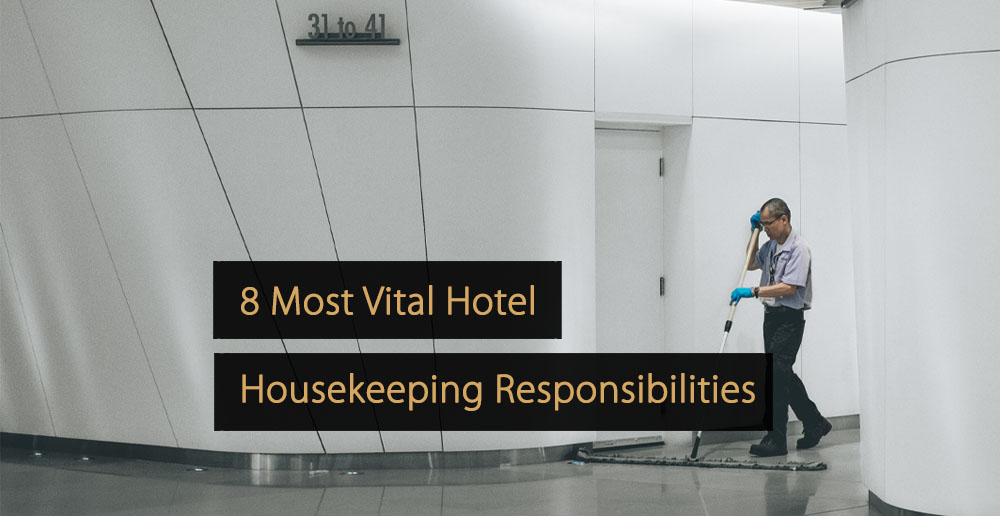The housekeeping department within a hotel plays a vital role in ensuring guests feel comfortable, safe and satisfied over the course of their stay. In this article, you can explore the various housekeeping responsibilities, learn about the tasks that housekeeping staff work on, and understand the true value of the department as a whole.
Quick Menu
- What is Hotel Housekeeping?
- The Significance of Hotel Housekeeping
- The Trolley as a Tool for Handling Housekeeping Responsibilities
- 8 Most Vital Hotel Housekeeping Responsibilities
- 1. Executive Housekeeper Management Duties
- 2. Management and Coordination
- 3. Hotel Room Cleaning and Preparation
- 4. Quality Control and Maintenance
- 5. Cleaning of the Hotel’s Public Spaces
- 6. Laundry and Upkeep of the Laundry Room
- 7. Representing Hotel Culture to Guests
- 8. Upkeeping and Tending Flowers Around the Hotel
- What Are Requirements for a Hotel Housekeeper?
- Technology to Assist With Housekeeping Responsibilities
- Room Attendant Guide: An Overview of Key Housekeeping Responsibilities
- Tips for Carrying Out Hotel Housekeeping Responsibilities
What Is Hotel Housekeeping?
The housekeeping department within hotels and similar forms of guest accommodation takes responsibility for ensuring guests are able to enjoy an environment that is clean, tidy, hygienic, safe, comfortable and pleasant.
This is important, because this experience of a pleasant and satisfying environment will go a long way towards helping customers to form a positive opinion about your hotel, and about their stay as a whole. By contrast, when expectations are not met in this area, no level of customer service is likely to make up for it.
Housekeeping responsibilities are varied, but are focused on ensuring the entire hotel is clean, safe, and welcoming. These responsibilities extend beyond hotel rooms, to the common areas within the hotel. Although most hotels do have a dedicated housekeeping team, it is also worth noting that responsibilities are often shared with other departments.
The Significance of Hotel Housekeeping
It is difficult to overstate the significance of housekeeping and the value that carrying out hotel housekeeping responsibilities properly can deliver. The majority of hotel guests who leave feedback or online reviews about your hotel are likely to mention how clean the hotel was, how clean their room was, and the level of safety they felt.
Of course, your hotel housekeeping responsibilities are also going to have an immediate impact on the guest experience too. For example, if supplies are not restocked within hotel rooms, guests are going to be unhappy and in need of assistance, and if rooms are not turned over in time, you are risking causing frustration due to check-in delays.
The Trolley as a Tool for Handling Housekeeping Responsibilities
Housekeeping employees use a variety of tools and hotel technology solutions as part of their job, but one of the single most important tools at their disposal is their housekeeping trolley, which can be used by individual staff members to assist with a wide range of housekeeping responsibilities.
Making intelligent use of a housekeeping trolley can save significant time on fetching equipment, and makes it much easier to carry out daily housekeeping tasks. At the beginning of a shift, housekeeping employees can ensure their trolley is stocked with many of the items they are going to need for the tasks that lie ahead.
For instance, cleaning agents, cloths, toilet paper rolls, towels, sheets, guest refreshments and other items can all be added to the trolley and organised in logical ways, while items being removed from hotel rooms can also be added. The necessary balance here is to use the trolley effectively, without overloading it or making it unsafe to push.
8 Most Vital Hotel Housekeeping Responsibilities
You can find out about eight of the most essential housekeeping responsibilities in the sections below:
1. Executive Housekeeper Management Duties
Executive housekeepers occupy a management position within a hotel and are tasked with overseeing the department and ensuring all hotel housekeeping responsibilities are on track. They are in charge of organising the work that needs to be carried out, and coordinating efforts from housekeeping staff and other departments.
Executive housekeepers are also responsible for managing housekeeping supplies, monitoring and continually improving housekeeping performance, hiring new housekeeping staff, delivering training and coaching, hosting meetings, managing employee morale, standardising housekeeping procedures, and managing all forms of communication.
2. Management and Coordination
In many businesses, front office responsibilities have significant crossover with housekeeping responsibilities. For example, a major part of effective housekeeping involves tracking the current status of hotel rooms, so that housekeeping employees can find the ideal time to clean a hotel room, or turn it over for a new guest.
Beyond this, housekeeping management tasks include identifying precisely which tasks need to be carried out and allocating these tasks to specific staff members. Furthermore, the housekeeping department and front office need to communicate effectively in the event that guests make specific requests, or voice a complaint about their room.
3. Hotel Room Cleaning and Preparation
Hotel housekeeping employees spend much of their time cleaning hotel rooms and preparing empty rooms for the arrival of new guests. Much of this work will typically occur in the early afternoon, after guests check out of their rooms, but some housekeeping responsibilities may occur at other points in the day too.
In general, rooms need to be cleaned, regardless of whether they are empty or currently occupied by guests. This means vacuum cleaning the floors, wiping surfaces clean, and changing sheets and towels. In rooms that are being prepared for new guests, in-room items will also need to be replenished, including shampoo, soap and toilet paper.
4. Quality Control and Maintenance
Although most hotels will have a dedicated maintenance team, there can be significant crossover with housekeeping responsibilities, and the housekeeping staff are often tasked with actually identifying problems and reporting them to the maintenance team. Moreover, housekeeping employees will take on quality control duties too.
This can involve inspecting hotel rooms and ensuring that all of the technology and equipment is fully functional. It also requires housekeeping employees to be on the lookout for any potential problems throughout the remainder of the hotel, and these employees are often the first to notice issues that need to be dealt with by the maintenance team.
5. Cleaning of the Hotel’s Public Spaces
When it comes to cleaning and similar hotel housekeeping responsibilities, many people immediately think about the duties that surround hotel rooms. However, a major part of any good housekeeping departments’ day-to-day operations are actually focused on the public spaces within the hotel, rather than the guest rooms.
Public spaces need to be kept clean and tidy, and the COVID-19 pandemic added a whole extra layer of hygiene requirements, which are likely to remain relevant for the foreseeable future in any parts of the world where levels of infection are high. Toilets must also be cleaned and maintained, and any hazards in public areas need to be removed.
6. Laundry and Upkeep of the Laundry Room
Laundry is one of the single most important housekeeping responsibilities, because guests require clean bed sheets, pillows, pillow cases, duvets and duvet covers, while some hotels will also have other items in the room that need to be washed, disinfected, ironed, and otherwise made ready for a new guest.
Using washing machines, dryers and irons are common tasks for housekeepers working in the hotel industry, but these employees also need to maintain the laundry room or area too. This means ensuring laundry equipment is fully functional, organising clean laundry, and making sure all of the equipment and surfaces are clean and disinfected.
7. Representing Hotel Culture to Guests
While housekeeping responsibilities are often focused on actions that take place away from guests, there is also a substantial customer service component associated with the role. After all, housekeeping employees are going to come into contact with guests as they carry out their work, and this is especially true when cleaning guest rooms.
Housekeeping employees, therefore, need to serve as ambassadors for the hotel and need to take the appropriate steps to represent the hotel’s culture. This includes being attentive and polite, answering any questions that guests have, fully understanding hotel operations, and generally upholding the service standards associated with the hotel.
8. Upkeeping and Tending Flowers Around the Hotel
Finally, many hotels will utilise flowers and plants as a way of improving the aesthetics of their property. Some studies have also suggested that including natural elements within an interior design can help to improve the mood of those within the building, which means plants and flowers can have a positive impact on the guest experience.
Of course, plant life within a hotel needs to be tended. Flower arrangements must be chosen carefully and new flowers will need to be brought in on a regular basis. Flowers and plants will also need to be watered regularly. Hotel management might also opt to acquire the services of horticulture professionals, who then work with housekeeping.
What Are Requirements for a Hotel Housekeeper?
In order to work effectively within the housekeeping department, and live up to the various housekeeping responsibilities, professionals need to be reliable, hardworking, and have a strong attention to detail. Teamwork is a key part of the job, but housekeepers should also be able to take initiative and work independently too.
The best candidates are likely to have previous cleaning, laundry, or maintenance experience, while customer service skills can be extremely advantageous. Those seeking senior roles within the housekeeping department will usually require significant experience working in hotels and an understanding of relevant housekeeping and hotel trends.
Technology to Assist With Housekeeping Responsibilities
In addition to understanding the nature of the role and the various housekeeping responsibilities that exist, professionals working in this area need to familiarise themselves with relevant housekeeping technology. This can include software like a hotel PMS system, along with technology like air purifiers and energy efficient vacuum cleaners.
If you would like to find out more about the numerous technology solutions that are available for use within a hotel housekeeping department, read “Housekeeping Technology; The Latest Tech used in Hotel Housekeeping”.
Room Attendant Guide: An Overview of Key Housekeeping Responsibilities
Many of the most common housekeeping responsibilities are tasks that are associated with the role of a room attendant. Essentially, a room attendant is responsible for cleaning hotel rooms, maintaining quality standards and carrying out relevant laundry tasks, while there can also be a customer service component as well.
You can explore the role of room attendant in greater depth, complete with a definition of the role, an overview of the main duties, a breakdown of career opportunities in this area, and a closer look at the education and training requirements, by reading the “Room Attendant Guide; Meaning, Job Description, Duties & Technology” post.
Tips for Carrying Out Hotel Housekeeping Responsibilities
Keeping your property clean is one of the most essential housekeeping responsibilities of all, and there are many ways to achieve this, from careful planning and intelligent use of digital checklists, through to automating certain tasks and making sure you use the best possible cleaning products.
You can find out about some of the practical steps that housekeeping staff should take to actually keep their hotel clean by reading the “Hotel Housekeeping Guide: 11 Tips & Tricks to Clean Your Hotel” article.
Housekeeping staff play a vital role in ensuring that guests have a pleasant stay in a hotel, but it is essential that all housekeeping responsibilities are fully understood. In particular, rooms and public spaces need to be kept clean, quality standards need to be upheld, sheets and towels must be washed, and maintenance work needs to be carried out.




